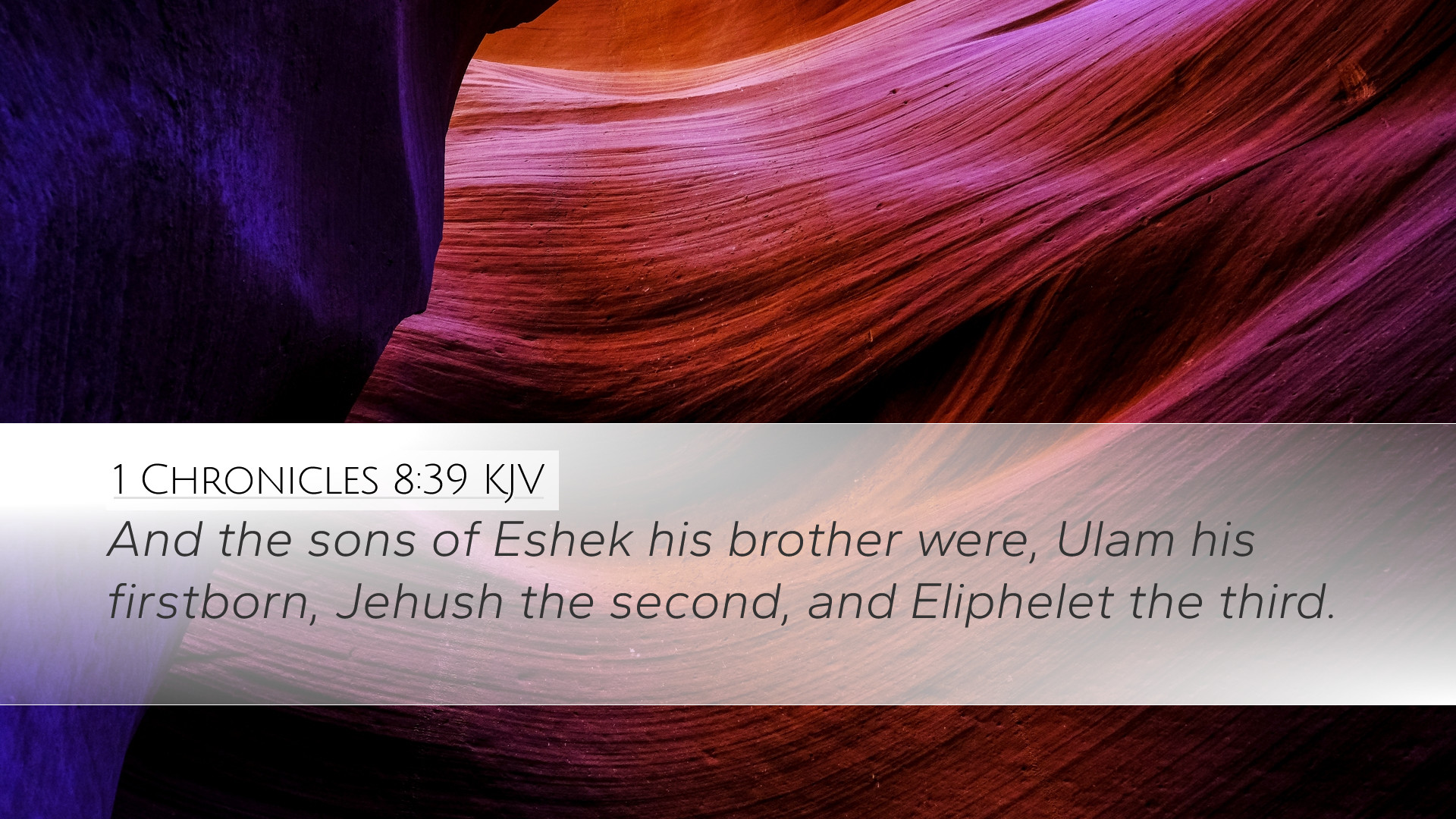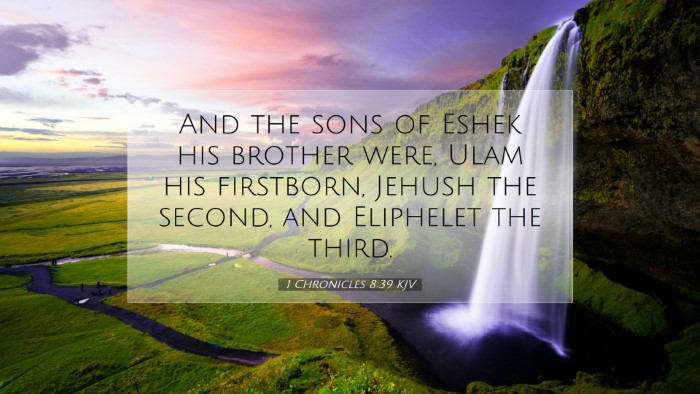Commentary on 1 Chronicles 8:39
Verse: "And the son of NER, Jehoiada, begat Ahitub, and Ahitub begat Ahimelech."
Introduction
This verse forms part of the genealogical records found within the Book of Chronicles, providing essential insights into the ancestry of significant biblical figures. 1 Chronicles 8:39 specifically highlights the lineage of Ahimelech, a priest during the reign of King Saul. The genealogical lists in Chronicles serve to establish the heritage of God’s people and their leaders, affirming the faithfulness of God in preserving a holy lineage.
Historical Context
The genealogies in Chronicles are not merely historical records; they reflect the theological themes of divine providence, covenant relationships, and the importance of priestly roles in Israelite worship. As we delve into this passage, it is critical to recognize its positioning within the broader narrative of Israel's history, specifically regarding the roles of priests and Levites in servicing the spiritual needs of the nation.
Insights from Public Domain Commentaries
Matthew Henry's Commentary
Matthew Henry emphasizes the significance of Jehoiada’s lineage. He often notes that the preservation of genealogical records demonstrates God's faithfulness across generations. Henry suggests that Jehoiada (the father of Ahitub) is representative of the noble priests of Israel, whose roles are pivotal during significant transitional periods in Israel's history. By tracing the lineage to Ahimelech, Henry points out the importance of the priesthood during Saul's time, indicating that these priests were instrumental in guiding the people spiritually amidst political turmoil.
Albert Barnes' Notes on the Bible
Albert Barnes notes that the mention of Ahitub and Ahimelech serves to remind readers of the priestly functions that were established during this tumultuous period. Barnes elaborates on the significance of Ahimelech as the priest who provided David with sustenance and Goliath’s sword, highlighting the intertwining of civil and sacred affairs in the Kingdom of Israel. He argues that the lineage indicates God's continual selection of leaders who are not only politically astute but also spiritually sound, emphasizing the critical nature of the priestly lineage in maintaining Israel's covenant with God.
Adam Clarke's Commentary
Adam Clarke offers a meticulous analysis of the names presented in this verse. He elaborates on the meanings and implications of the names, suggesting that Ahitub may mean "brother of goodness," which reflects the nature of his descendants' roles as custodians of the worship of Yahweh. Clarke’s commentary brings a practical application to this genealogical record, positing that the integrity and devotion of these priests serve as a model for current congregational leadership. Furthermore, he emphasizes that Ahimelech’s actions in aiding David illustrate the importance of righteousness and loyalty to God's anointed leaders, even in times of adversity.
Theological Implications
The verse intricately weaves together themes of faithfulness, lineage, and the sovereignty of God in guiding His people. The role of priests as mediators between God and humanity is accentuated here. The generations leading to Ahimelech signify how God's providence operates through individual choices made in faithfulness to His calling.
Priestly Lineage
The significance of the priestly lineage is a recurrent theme throughout scripture. Leaders are called to uphold the covenant and guide God’s people in righteousness. The lineage established by Jehoiada serves as a reminder of God’s plan for leadership that is both spiritual and political. This interplay invites contemporary leaders to consider their dual role in guiding their congregations politically and spiritually.
Application for Modern Leaders
- Integrity in Leadership: Just as Jehoiada’s lineage pointed to steadfast priestly duties, today’s leaders must uphold integrity and righteousness in their roles.
- Covenantal Faithfulness: Like Ahimelech who aided David, current leaders must remain loyal to God’s anointed and fulfill their God-given responsibilities vigilantly.
- Generational Influence: The heritage of faith informs the next generation of leaders, exemplifying the importance of instilling strong spiritual principles in the community.
Conclusion
The genealogy in 1 Chronicles 8:39 serves as more than a mere listing of names; it is a testament to the faithfulness of God throughout Israel’s history. The insights gathered from the commentaries of Matthew Henry, Albert Barnes, and Adam Clarke illustrate that this passage encapsulates vital themes regarding leadership, the continuity of the priesthood, and the importance of spiritual integrity. As such, it stands as a rich source of reflection for pastors, students, theologians, and Bible scholars who seek to understand the intricate tapestry of God’s plan through the generations.


